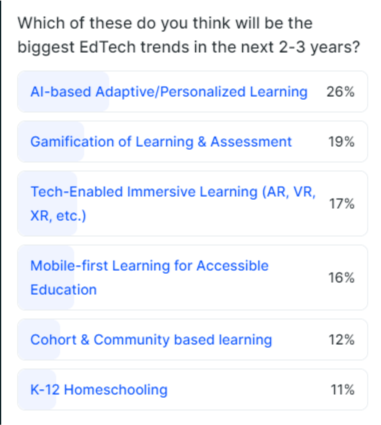EdTechReview, in association with Searce and Google Cloud, organized a webinar on Fueling EdTech Revolution Through Cloud Technologies – Securely & Cost Efficiently.
The pandemic brought unprecedented challenges, and technology was the savior. Cloud technologies became necessary as education and work shifted to remote and online environments. For an EdTech founder, understanding the cloud’s complexity, scalability, security, and cost is vital when dealing with millions of users and learners.
This webinar addressed such technicalities and many other questions around the future of EdTech, industry growth, user acquisition and experience, artificial intelligence and machine learning in EdTech, and understanding of the role of Google Cloud & Searce in the EdTech space.
Watch the webinar recording:
Here are a few excerpts from the session:
Ankit Sinha started the session with his first question to Ankit Khanna on Suraasa’s 2022 focus. Ankit Khanna shared that “teacher education is the heart of every education section (K12 to Higher Education). We are moving with a mission to create a network of one million highly skilled teachers, and our focus for the next year is to create continuous learning journeys for teachers through paid and free resources and enable them to experience the power of Suraasa Technology in their Skill Development, Career Evolution, and Global Impact.”
The next panelist to join the discussion was Ayush Varshney. He shared his journey in tech and the inception of Testbook, the biggest online preparation platform for government exams in India. “Testbook is one of the largest exam preparation platforms in the country with almost 30M students and 2.5M paid users. Many student recommendations are happening using data. The focus now is to use data to improve students’ chances of success. We have also launched SkillAcademy, making vocational learning accessible to a large audience. Our Tech Focus is scaling the data recommendations and building new products for Skill Learning,” he says.
Shikhar Goel added to the discussion by sharing his take on the need for quality software developers and how quality online education is directly related to it.
The next question was about prioritizing the never-ending challenges our leaders face and how they go for the selected solution from many great ideas. “We have a 3 Step rule that helps them identify the right ideas,” Ankit Khanna answered. “It is to check if the idea is in sync with the current business model, teachers, and value proposition. The next step is to check if the idea adheres to the core values. Finally, the last step is to analyze and understand the impact of implementing the idea in terms of value and timeline.”
The next question was to Shounak Acharya about Google’s mission and how Google Cloud has been making itself useful in the EdTech space. He answered by explaining, “Google's mission is to make information more accessible, especially in cloud play for the people generating this information.” He further explained the four pillars of the Google Cloud that make it instrumental in EdTech: collaborative cloud, developer-centric cloud, data cloud, and trusted cloud.
Live polls during the webinar took audience opinions and that of other EdTech founders & CTOs on what they feel about the upcoming EdTech trends and Google Cloud usage. Here are the results from the polls:
Which of these will be the biggest EdTech trends in the next 2-3 years?

Twenty-six percent of people voted for AI-based Adaptive/Personalized Learning; 19 percent believe Gamification of Learning & Assessment is the next big thing; 17 percent of people opted for Tech-Enabled Immersive Learning, including Augmented Reality, Virtual Reality, and more; 15 percent people selected Mobile-first Learning for Accessible Education; 12 percent people opted for Cohort & Community based learning and the lowest at 11 percent for K-12 Home schooling.
The panel engaged the audience in a QnA covering many sub-topics. The webinar also discussed:
- Challenges worth solving faced by Leaders, and ones that TECH could solve for them.
- Individual journeys, initiatives that teams executed well, and business value.
- Matters of trust, security, and privacy in online businesses and cloud data storage.
- Things that their solutions can change in the EdTech space and more.